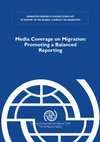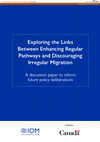Papers by Anna Triandafyllidou
IMISCOE research series, Oct 3, 2023
The loss of over a thousand human lives in an effort to cross the Mediterranean during April 2015... more The loss of over a thousand human lives in an effort to cross the Mediterranean during April 2015 has once again drawn media and political attention to the challenges that the EU is facing in governing irregular migration and asylum in the region. However, what seems to be still missing is our (experts’ and policy makers’) understanding of what drives people to put their lives at risk in search of a better future.

This paper is part of the IOM Migration Research Leaders Syndicate’s contribution toward the Glob... more This paper is part of the IOM Migration Research Leaders Syndicate’s contribution toward the Global Compact for Migration. It is one of 26 papers that make up a consolidated Syndicate publication, which focuses on proposing ways to address complex and pressing issues in contemporary international migration. The Migration Research Leaders Syndicate, convened as part of IOM’s efforts to extend policy and technical expertise in support of the Global Compact for Migration, comprises senior researchers from diverse geographic, disciplinary and thematic backgrounds. The Syndicate provides a channel for leading experts in migration to propose ideas to meet the ambitious goals outlined in the New York Declaration for Refugees and Migrants of September 2016. In technical papers such as this one, Syndicate members were invited to identify and propose ways to resolve key conundrums currently posing challenges to international migration governance. To hone their proposals, they benefited from t...

Migrant Smuggling Data and Research: A global review of the emerging evidence base (Volume 2) pre... more Migrant Smuggling Data and Research: A global review of the emerging evidence base (Volume 2) presents a unique review of what is being collected and what can be done to further build the evidence base on migrant smuggling globally. The second volume on the topic, and building on the 2016 report, Volume 2 is again the result of a collaboration between the International Organization for Migration and researchers from a range of backgrounds and academic disciplines, and supported by the Government of Turkey. The report shows that important research has been undertaken on the transnational crime aspects of migrant smuggling, including on routes, smuggling organization (such as criminal networking and facilitation), smuggler profiles and fees/payment. Likewise, there is an emerging academic literature on migrant smuggling, particularly the economic and social processes involved in smuggling, which has largely been based on small-scale qualitative research, mostly undertaken by early-ca...
In September 2017, the European Commission Communication on the Mid-Term Review of the EU Agenda ... more In September 2017, the European Commission Communication on the Mid-Term Review of the EU Agenda for Migration acknowledged ‘undeclared work’ in specific sectors of the economy of various member states as a ‘pull factor’ for irregular migration to the EU. By analysing the case of Italian agriculture, this policy brief – based on the findings of a comprehensive report commissioned by the Open Society European Policy Institute and drafted by a team of researchers coordinated by the European University Institute - turns the argument on its head, demonstrating that the supply of (irregular) migrant labour is only one of the factors that impact the wider process of restructuring of agricultural production, which began in the 1990s.

The relationship between discouraging irregular migration through enforcement and encouraging reg... more The relationship between discouraging irregular migration through enforcement and encouraging regular migration flows is not straightforward. Relevant studies have highlighted complex dynamics. While stricter controls through both “fencing” (border controls) and “gatekeeping” (visa restrictions) policies appear to slow irregular migration, they also tend to change its course, leading migrants to try their luck through alternative irregular channels. Understanding migrant decision making as well as the contexts in which potential migrants make decisions is critically important but often misunderstood or ignored in policy deliberations. This discussion paper reviews a number of policy ideas that could lead to better management of regular migration while discouraging irregular flows as well as decision making contexts: Enhanced regional mobility regimes that allow for relatively seamless mobility within a set of countries, coupled with specific rights and obligations for workers and em...
Routledge eBooks, May 27, 2021
Routledge eBooks, May 27, 2021
This work proposes a common European intellectual framework to evaluate recent developments in Eu... more This work proposes a common European intellectual framework to evaluate recent developments in European multiculturalism. The heightened security awareness in the wake of the 9/11 attacks and the London and Madrid bombings has resulted in a'crisis of multiculturalism'. Now is the time to look at the renewed challenges that multiculturalism faces today. Each chapter in this interdisciplinary book reviews the actual state of affairs in several countries in relation to the theories behind immigrant minority claims. With a ...
Routledge eBooks, May 27, 2021
Religion, State and Society
Edinburgh University Press eBooks, Jul 3, 2017
Rethinking Migration and Return in Southeastern Europe
The Problem of Religious Diversity
This chapter introduces the geopolitical and conceptual framework within which this book is place... more This chapter introduces the geopolitical and conceptual framework within which this book is placed. It starts by discussing recent changes in Europe and the world that have framed the governance of religious diversity and then moves on to critically address the concept of secularism and whether it offers the appropriate normative tools to address religion today. It suggests that some European versions of political secularism – specifically, moderate secularism – are designed to be accommodative of religion but are not sufficiently adapted to contemporary diversity. Asia and the Middle East have much experience of accommodating diversity even if the dominant trend at the moment is majoritarian nationalism. The chapter concludes with an outline of the contents of this volume.
European Multiculturalisms, 2011
This is the introduction to the book 'European Multiculturalisms: Cultural, Religious and Eth... more This is the introduction to the book 'European Multiculturalisms: Cultural, Religious and Ethnic Challenges'.

The Problem of Religious Diversity, 2017
Religion and religious diversity are one of the toughest diversity challenges that European socie... more Religion and religious diversity are one of the toughest diversity challenges that European societies face today. Old paradigms of republicanism or multiculturalism seem to be in crisis but a new “third way” between laicité and state religion is not yet visible. This book questions whether the best way to deal with religious diversity is to equalise upwards or downwards, what are the obstacles to a more egalitarian religious pluralism, and what we can learn from policies and practices in the Middle East and Asia where religious plurality and the integration of religion in the public space is the norm rather than the exception. The first part of the book discusses the type and degree of secularism that is fit for addressing the challenges of religious diversity that contemporary western societies face at a theoretical or normative level, while its second part engages with the experiences of countries in Europe, the Middle East, Asia and Oceania in their governance and accommodation o...
High-Skill Migration and Recession, 2016











Uploads
Papers by Anna Triandafyllidou
Albanian citizens (first and second generation) towards Italy and Greece in the 2010s. It develops a new analytical framework for making sense of return, remigration, and circular mobility by conceptualizing them as different phases of a wider migration process. We disentangle reintegration from return and question whether and how successful reintegration can discourage or encourage remigration, depending on the opportunity structure and motivations of the migrant. This book is inscribed in an innovative strand of the literature that brings together the study of return, reintegration, and remigration with that of circular migration – an understudied but much-discussed phenomenon in itself – showing how these different flows are part of a wider, complex migration pattern. Likewise, this study departs from linear concepts of migration between an origin and a destination and privileges an understanding of migration as a segmented or cyclical pattern that may involve several localities and more than two countries.